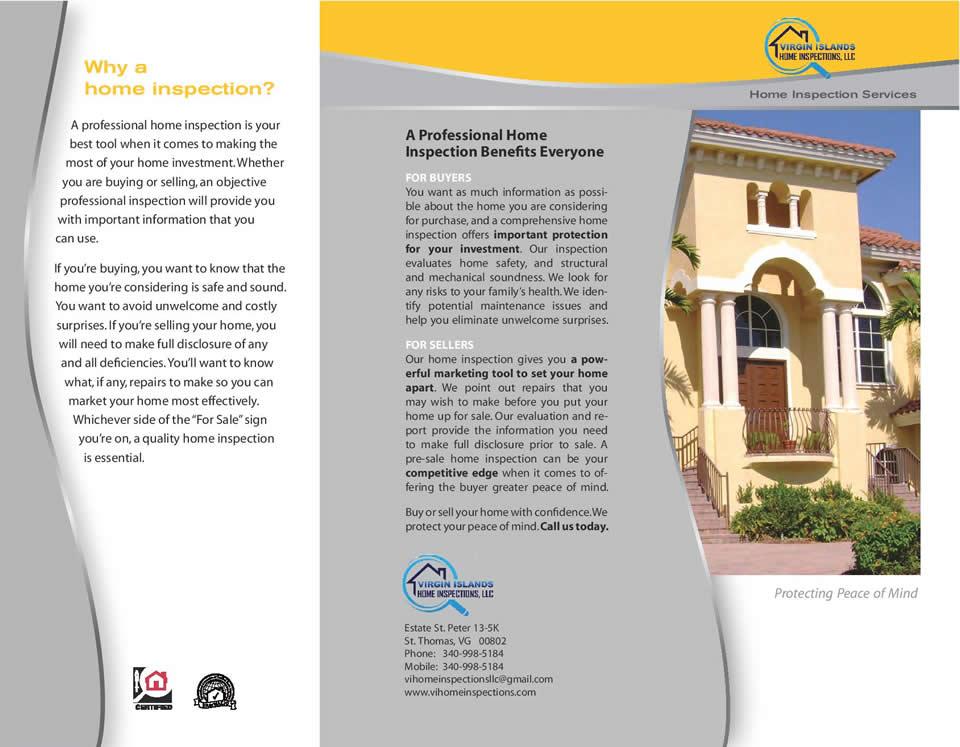Home Inspection Services
- An experienced inspector will prepare your Home Inspection Reports with easy-to-read details on:
-
- The condition of every major component from the roof to the basement
- Major and minor deficiencies
- Any major expenditures necessary
- What to watch out for
- Helpful home preservation tips
- Safety concerns
- And much more
Our Home Inspector will review the detailed report with you to make sure you understand everything and answer any remaining questions.
- Pre-Purchase Inspection
-
A home inspection is a visual process where all of the items typically used within a home are tested and/or operated to verify proper operation or installation. Doors and windows are opened and closed, roofing materials inspected, air-conditioning and heating systems operated. The Inspector will fill the sinks and tub(s), run the shower(s), and flush the toilets. All the while making notes on the condition and operation of the components tested. Upon completion a report will be distributed to you.
- Pool & Spa Inspections
-
A beautiful-looking pool should not fool you into thinking everything is okay. You need to have peace of mind knowing, for instance, that the pool is properly plumbed, that all equipment, skimmers, lights are working properly, and that GFCIs are properly installed. You need to avoid being caught off guard if costly repairs are needed. A pool inspection is money and time well spent.
What is included in a pool or spa inspection? The condition of all accessible components of the pool, equipment and surrounding environment are evaluated, including a safety checkup of the pool and pool area. We note the condition of the pool walls, coping, stairs, skimmers, diving board, ladders, filter and multiport valve, pump and motor, chlorinator, heater, automatic cleaner, underwater lights, time clock, valves, fencing, decks, winter cover and spa if applicable.
- New Construction Inspections
-
New construction inspections are performed at the completion of construction, but prior to your final walk through with the Builder's Customer Service Representative or Superintendent. It is always a good idea to verify that utilities (gas, water, and electric) have been turned on, either by you or the Builder depending on the Builder's policy. The inspection should be scheduled just a day or two before your final walk through with the Builder. This will ensure that most, if not all, last minute items have been completed prior to your inspection. At the conclusion of the inspection a completed report will be distributed to you.
- Pre-Warranty Expiration Inspections
-
Warranty inspections are performed during the 11th month of your 1-year Builder Warranty. The inspection will be performed to verify that proper building techniques were used and that the various components of the home were properly installed. You will be presented with a completed report at the end of the inspection along with digital photos taken as needed for inaccessible areas.
-
Investor Property Inspections
(Includes Multi-Unit Housing) -
Investor property inspections are performed prior to purchase as well as periodically during ownership. Pre-purchase inspections are performed to identify defects prior to taking ownership to negotiate repairs or price adjustments which reflect the condition of the property. Periodic inspections for properties currently in your portfolio would ensure the identification of needed repairs following say a long term tenant's departure. Long-term tenants sometimes neglect to mention repairs and/or abuse the property during their tenancy. Identifying those problems early is the key to profitable ownership.
-
Seller Certified Home Program
(Pre-Listing Inspections) - Listing inspections are very good for the homeowner who may not be in tune with the condition of their home. A great many sales are cancelled due to the buyer's shock at the "functional condition" of the home. It may look great, but have serious technical, safety, or functional issues present without the owner's knowledge. Having the home inspected prior to placing on the market is the ideal way to identify and either repair or disclose the issue found in the Inspection Report. Obviously, repairing the items would be the most beneficial towards completing the sale. However, there may be financial reasons where the owner can't make the repairs. Disclosing them up front and pricing the home based upon that disclosure will often times produce a higher net sales price for the owner.


